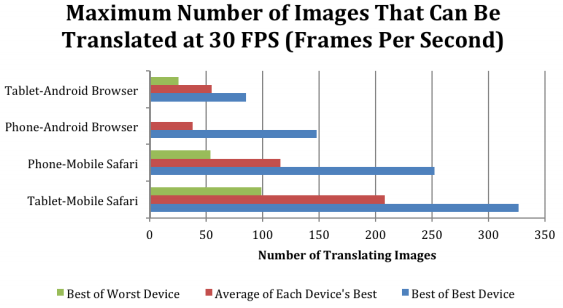A new study has found that iOS offers better HTML 5 performance than Android, according tests conducted by cloud-based games platform Spaceport. The Perfmarks benchmark suite compares the performance of a mobile gaming engine supporting vector graphics, which details the performance of HTML 5 apps on different mobile hardware and software platforms, to objectively compare which offers the best experience.
As part of the report, each device and its operating combination were tested to demonstrate their ability to animate image movement. Essentially Spaceport measured the number of moving images that can be displayed at any one time whilst maintaining a minimum frame rate of 30 frames per second, which is considered a minimum baseline for smooth animation rendering.
Apple's iPhone 4S scored well, handling over 200 moving objects whilst maintaining a frame rate of 30 FPS. Even the oldest iPhone tested, the iPhone 3GS managed 53 anminated objects at the baseline frame rate of 30FPS. The iPad 2 scored best, with over 300 objects at 30 FPS.

At the other end of the scale, the worst Android-based smartphone, the Motorola Droid was unable to even display one anminated object at 30FPS. The best performing Android device was Google's new Galaxy Nexus S running Android 4 Ice Cream Sandwich, with around half the frame rates of the iPhone 4S.
The report concluded that iOS offers around three times better HTML 5 performance than Android. The top performing device was the iPad 2, with the highest level of performance for HTML 5-based games. It also found that the default Android browser was outperformed by iOS devices in nearly every scenario.
Spacepoint also pointed out that support is still a long way off being perfect on mobile devices: "Although the Safari Mobile Browser on iOS has faster performance than the Android Browser on Android, neither currently support speeds that are anything near that of native code. This was one of the major motivations behind Spaceport. It will probably take years for HTML5 to reach native-quality performance."
Currently, the Perfmarks report (PDF) only compares the iOS and Android platforms, but it is hoped future tests will include a wider range of devices for better comparison.